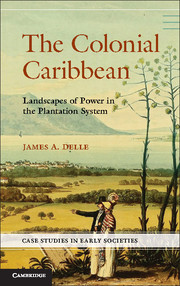Book contents
- Frontmatter
- Contents
- Figures
- Tables
- Preface
- 1 Landscapes of Power in the Colonial Caribbean
- 2 His Majesty’s Island
- 3 The Plantation Mode of Production
- 4 A Class for Itself: Regional Landscapes of the Planter Class
- 5 Contradictions and Dialectics: Village Landscapes of the Enslaved
- 6 Dialectics and Social Change: Plantation Landscapes after Slavery
- 7 Plantation Landscapes in Comparative Perspective
- 8 Conclusion
- References
- Index
3 - The Plantation Mode of Production
Published online by Cambridge University Press: 05 June 2014
- Frontmatter
- Contents
- Figures
- Tables
- Preface
- 1 Landscapes of Power in the Colonial Caribbean
- 2 His Majesty’s Island
- 3 The Plantation Mode of Production
- 4 A Class for Itself: Regional Landscapes of the Planter Class
- 5 Contradictions and Dialectics: Village Landscapes of the Enslaved
- 6 Dialectics and Social Change: Plantation Landscapes after Slavery
- 7 Plantation Landscapes in Comparative Perspective
- 8 Conclusion
- References
- Index
Summary
Most social theorists agree that in any given historical context there exists an underlying logic binding individual human beings into coherent social groups. The nature of this underlying logic has been debated for centuries and, perhaps because social phenomena are so complex, no consensus has yet been reached on just how to define the forces that bind individuals into groups and shape the nature of human relationships within and between recognized groups.
Karl Marx proposed that societies formed when human beings worked together to acquire and distribute the necessities of life; to Marx this meant that human society had a material, or physical, base (Engels 2007; Marx 1979). Because different societies would define different needs for themselves, they would develop both different tools and technologies for the acquisition and use of these necessities and different social structures to facilitate the production, distribution, and consumption of these things. Marx thus argued that a variety of different social formations would historically emerge. Because Marx argued that the production of goods and services was the primary force binding societies together, he defined the various social formations that historically developed as “modes of production” (Marx 1979, 1992).
- Type
- Chapter
- Information
- The Colonial CaribbeanLandscapes of Power in Jamaica's Plantation System, pp. 64 - 108Publisher: Cambridge University PressPrint publication year: 2014



